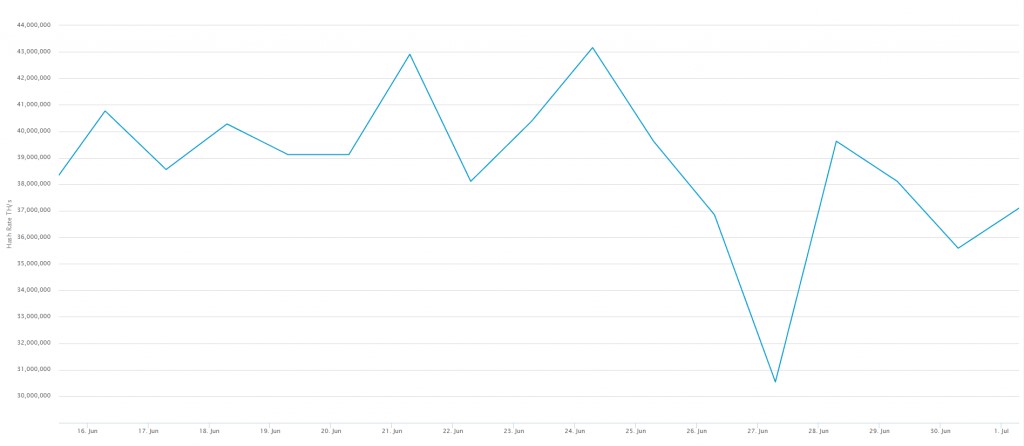China is the world’s undisputed leader in bitcoin mining and home to the largest mining pools including AntPool, BTCC, F2Pool and BW. Despite feverish efforts by the government to stamp out the trade, China remains largely responsible for keeping the bitcoin industry alive with 70 percent of bitcoins mined there.
But the thriving industry could now be under threat, this time not from the Beijing government but from Mother Nature.
Severe storms have devastated 48 cities in Sichuan and Shandong provinces leaving a trail of destruction in their wake. The country’s Ministry of Water Sources estimates that at least 250,000 people have fallen victim to nature’s fury, one that has wreaked havoc and economic losses amounting to $111 million. Sadly, it appears that the floods have also taken out a bunch of Chinese miners as evidenced by the image below as well as bitcoin’s hash rate nosediving after the floods:

(Click to enlarge)
Source: CryptoSlate
Bitcoin Hash Rate Plunges Then Corrects
According to Golden Finance, China’s cryptocurrency news platform, the Sichuan flooding led to the loss of tens of thousands of mining rigs, most of them damaged beyond repair.
Those reports appear believable going by the rate at which mining activity plunged at the advent of the floods. The Bitcoin hash rate dropped from roughly 43 million TH/s at the time the floods hit to just 30 million 24 hours later, a massive 30-percent decline.

(Click to enlarge)
Source: CryptoSlate
The interesting thing is that the sharp drop soon corrected, suggesting that miners elsewhere picked up the slack. But does that mean that China’s role in the bitcoin ecosystem is overrated? Probably not. After all, China has become the world’s pre-eminent haven for cryptocurrency mining for a reason. Related: What Sparked Gold’s Unexpected Rally?
First off, bitcoin mining costs in China are considerably lower compared to other countries with comparable infrastructure.
U.S.-based electric hardware supplier Elite Fixtures crunched the numbers in February that estimated bitcoin mining costs in different countries. China’s cost of mining a single bitcoin clocked in at $3,172, considerably cheaper compared to costs in other major mining nations including Sweden ($4,746), Georgia ($3,316) and the Unites States ($4,758). In fact, only 16 countries across the globe boast cheaper mining costs.
But more importantly, China has plenty of under-utilized infrastructure in provinces like Sichuan where vast amounts of electricity are generated in coal and hydro-electric power plants. These companies tend to sell their excess capacity to huge miners on the cheap. And that’s an acceptable arrangement for them because the power would otherwise go to waste.
Others have even started their own mining operations to utilize the excess power as well as available water for cooling. Not many countries can lay claim to such abundance.
Other Countries To the Rescue
So what would happen in a hypothetical situation where China’s bitcoin output fell dramatically and irrevocably?
The most likely outcome would be that neighboring jurisdictions like Hong Kong and Mongolia would seize the opportunity to ramp up their own production. Hong Kong has been trying to establish itself as a leading hub for crypto-assets, although high electricity costs would prove challenging for miners.
Meanwhile, Mongolia with its impressive fiber internet connections would be a good alternative, while other major producers such as India Georgia, U.S. and Japan would likely also step up.
One thing is sure though: China’s low production costs help to stabilize the industry, and other players would struggle to fill its shoes.
By Michael Kern for Safehaven.com
More Top Reads From Safehaven.com:
















